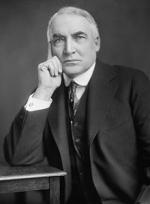Disable ads!
Warren G. Harding
Warren Gamaliel Harding (November 2, 1865 – August 2, 1923) was the 29th President of the United States (1921–23), a Republican from Ohio who served in the Ohio Senate and then in the United States Senate, where he played a minor role. With the Republican Party convention near deadlock, Harding was chosen as an inoffensive compromise candidate in the 1920 election. He brought leading advertising experts on board, especially Albert Lasker, to publicize his presidential appearance and conservative promises. He promised America a "return to normalcy" after World War I, with an end to violence and radicalism, a strong economy, and independence from European intrigues. "America's present need is not heroics, but healing; not nostrums, but normalcy; not revolution, but restoration; not agitation, but adjustment; not surgery, but serenity; not the dramatic, but the dispassionate;... not submergence in inter-nationality, but sustainment in triumphant nationality." Harding represented the conservative wing of his party in opposition to progressive followers of the late Theodore Roosevelt (who died in 1919) and Senator Robert M. LaFollette, Sr. He defeated Democrat and fellow Ohio newspaper publisher James M. Cox with the largest popular vote landslide (60% to 34%) in presidential history. Harding's cabinet included Andrew Mellon at the Treasury, Herbert Hoover at Commerce, and Charles Evans Hughes at the State Department. He rewarded friends and contributors, known as the "Ohio Gang", with powerful government positions. Multiple cases of corruption were exposed during his presidency and after his death, including the notorious Teapot Dome scandal, regarded in pre-Watergate times as the "greatest and most sensational scandal in the history of American politics". Domestically, Harding signed the first federal child welfare program, and dealt with striking mining and railroad workers in part by supporting an 8-hour work day. He created the Bureau of the Budget to prepare the first United States federal budget. Harding advocated an anti-lynching bill to curb violence against African Americans, but it failed to pass Congress. In foreign affairs, Harding spurned the League of Nations and negotiated peace treaties with Germany and Austria. His greatest foreign policy achievement came in the Washington Naval Conference of 1921–22, in which the world's major naval powers agreed on a naval limitations program that held sway for a decade. In August 1923, Harding suddenly collapsed and died in California. His administration's many scandals have earned Harding a bottom-tier ranking from historians, but in recent years there has been some recognition of his fiscal responsibility and endorsement of African-American civil rights. Harding has been viewed as a more modern politician who embraced technology and was sensitive to the plights of minorities, women, and labor.
 Read more on wikipedia.org Read more on wikipedia.org
 All quotes by Warren G. Harding All quotes by Warren G. Harding
 Edit Edit
|

|
|
|
|
|
Background photo by Giuliana
|